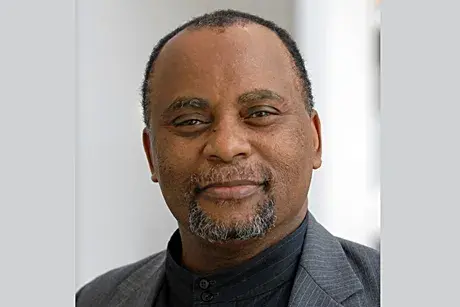Welcome, Professor Bernard Freamon
A leading scholar, teacher and clinician from Seton Hall joins RWU Law, taking the reins of its new required course on race and the law: 'We’re not just teaching about law, we’re teaching about justice.'

Roger Williams University School of Law is proud to welcome a new member to its outstanding faculty: Professor Bernard K. Freamon is already hard at work refining and refocusing the law school’s new required course, “Race and the Foundations of American Law,” and attending planning meetings for the course. He will also teach a number of other courses, including Evidence and a seminar on slavery and human trafficking.
“I teach about slavery; that’s my scholarship,” he said. “So I have been deeply engaged in theoretical thinking on the legacy of slavery and race in America. I created the Center for Social Justice at Seton Hall with the same goal of getting these ideas into the curriculum—so that we’re not just teaching about law, we’re teaching about justice.”
Professor Freamon brings a unique and impressive set of qualifications to the job. A Professor of Law Emeritus at Seton Hall Law School, he has visited on the law faculties of the University of Nairobi, Washington and Lee University, Rutgers University (Newark), and Pace University’s School of Law; and he has served as an adjunct faculty member at New York University School of Law for the past four years, teaching Islamic Jurisprudence. He also recently taught an innovative course on slavery and human trafficking, based in Zanzibar, Tanzania, and sponsored by the Global Education Program at George Mason University.
I envision creating a law school curriculum that is more justice-oriented, and more sensitive to the problem of race in American law—because race is, in fact, central to how American law functions.
~ Professor Bernard K. Freamon
Over the course of his career, Professor Freamon has worked as a project director for the American Civil Liberties Union, focusing on civil rights and civil liberties. He also has extensive experience in clinical legal education. As founding director of Seton Hall’s Center for Social Justice, he participated in extensive litigation in the federal courts, including the Supreme Court of the United States, pertaining to the First, Fifth, Sixth, Eighth and Fourteenth Amendments. In addition, he has worked on a variety of issues in the state courts related to the wellbeing of the poor, the underrepresented, religious minorities, lawyers, prisoners and criminal defendants.
In recent years, much of Professor Freamon’s research and writing has focused on Islamic law and jurisprudence. He recently published the first comprehensive legal history of slavery and abolition in the Muslim world and he is currently at work on a textbook for law students on slavery and human trafficking. It was his work in this area of law in particular that drew him to RWU Law.
“When I heard that Roger Williams had an opening for someone to direct this program, I thought, “Well, this is actually what I’m trying to do, too, in my teaching and in my scholarship.” It was a confirmation of what I was already thinking and doing. It was just a natural fit.”
Professor Freamon envisions the “Race and the Foundations of American Law” course as a potential springboard for the establishment of a center that serves both the School of Law and the wider University.
“I see it serving as the hub for what could become a Center on Race and the Foundations of American Law,” Professor Freamon said. “I envision a place; a think tank of sorts, where we could strive for a critical mass on the problem of integrating race into the American legal curriculum. It would be a resource for other law professors and law schools, in terms of creating a law school curriculum that is more justice-oriented, and more sensitive to the problem of race in American law—because race is, in fact, central to how American law functions. It would be a place that people could visit from other law schools and universities.”
It’s a development whose time has now fully arrived in the public consciousness, Professor Freamon added—akin to the growing awareness and acknowledgement of the ways in which the U.S. legal system has traditionally been stacked against victims of rape, sexual assault, and sexual harassment. In his view, these issues are analogous to the problem of race in American law.
“This consciousness is driven, for example, by the things that happened to George Floyd and others; things that are happening in our society right now,” he said. “Students are demanding that these issues be addressed—similar to student demands for relevancy in the classroom back in the 1960s. They want to be equipped with the tools they need to build not just a race-neutral practice, but an anti-racist practice.”
Professor Freamon expects that these demands will only grow with time, and that a Center on Race and the Foundations of American Law could help legal education rise to the challenge.
“In five or 10 years, I think a course like this will be a mandatory course in a lot of law schools,” he said, while observing that every student will initially approach this material through their own unique lenses. In fact, bringing together students with different views on race and the law is part of the purpose and importance of the course.
“Dialogue about race is difficult, but it is so important,” Professor Freamon said. “There are still a lot of issues we must confront, and RWU Law is well ahead of the curve in teaching our future lawyers how to confront them.”
